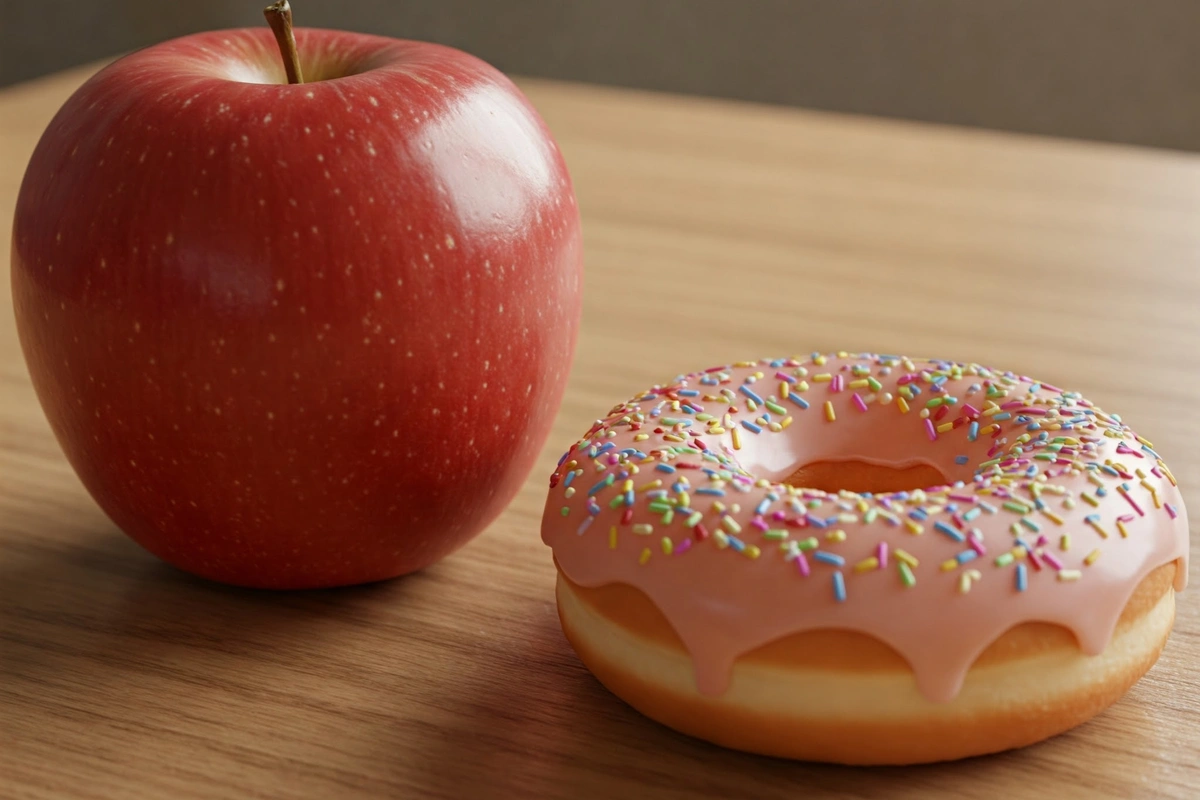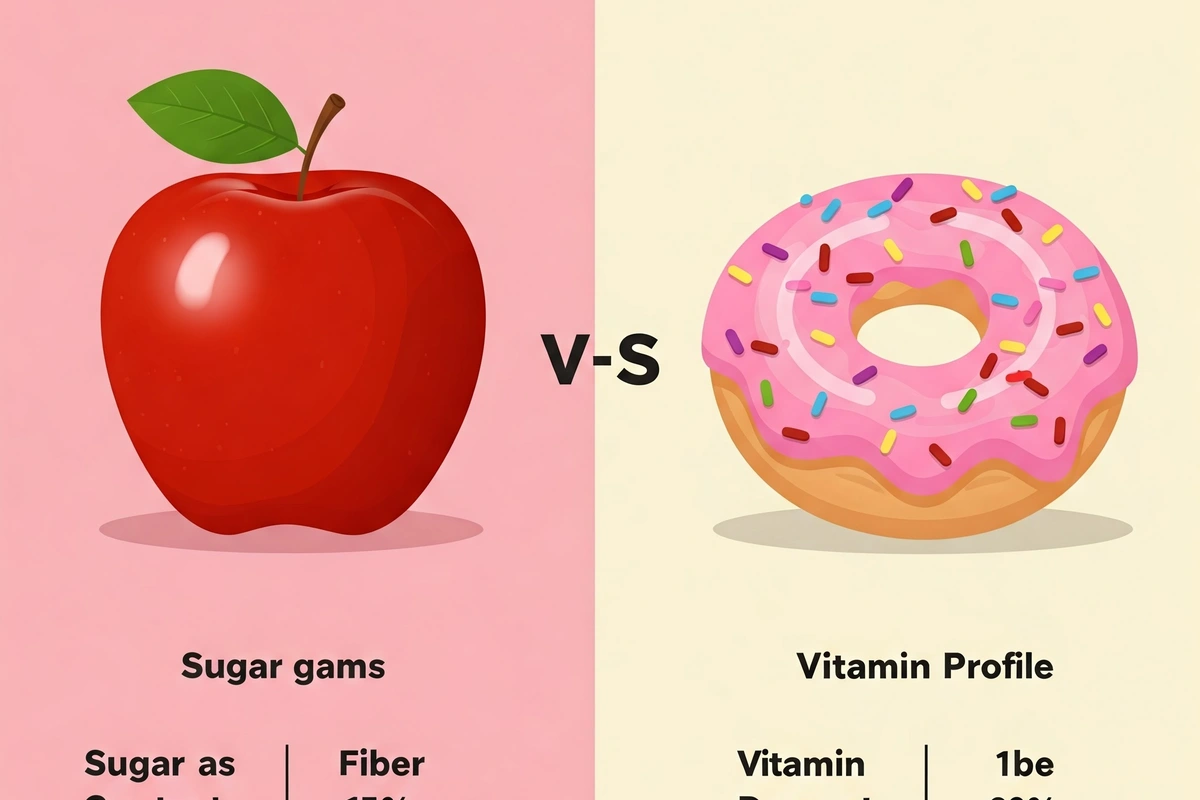This article explores apple vs donut sugar, health insights, and tips to manage sugar intake effectively. Discover the truth now.
Introduction
Many people wonder if fruit can hide just as much sugar as a sweet dessert. Does an apple have as much sugar as a donut? This question sparks countless debates and confusions about health, weight management, and everyday dietary choices. Indeed, fruit contains sugar in the form of fructose. However, donuts generally pack refined sugar alongside fats, making them quite different from fresh fruits. Consequently, understanding the nuances of sugar type, fiber content, vitamins, and other factors is crucial.
In this article, we will compare apples and donuts based on their sugar profiles, glycemic impacts, and overall nutritional value. We will also explore how apples differ from donuts in terms of health benefits, weight management, and disease prevention. Furthermore, we will discuss how you can use this knowledge to make informed diet decisions. Ultimately, you will see that comparing a naturally sweet fruit to a fried pastry is not as straightforward as it may appear. Read on to discover the truth about sugar in apples and donuts, and learn simple strategies to maintain a balanced lifestyle.
Does an apple have as much sugar as a donut? Basic Overview
Does an apple have as much sugar as a donut? At first glance, both apples and donuts provide sweetness. Nonetheless, they differ significantly in the type of sugar they contain. Apples typically contain a combination of fructose, glucose, and sucrose. Donuts usually contain large amounts of added refined sugar. Accordingly, one is a naturally occurring sugar within the fruit itself. Another is often added during the baking or frying process to enhance flavor.
Comparatively, apples also offer water, fiber, vitamins, and antioxidants. Meanwhile, most donuts are typically rich in refined carbohydrates, fats, and artificial additives. Therefore, while both apples and donuts have sugar, the presence of other nutrients shifts their overall health value. In most dietary guidelines, fruit is encouraged because of its beneficial nutrients, while pastries should be consumed in moderation.
Does an apple have as much sugar as a donut? Nutritional Perspective
When exploring the question, Does an apple have as much sugar as a donut? it helps to compare their nutritional values per 100 grams. As you can see in the table below, apples and donuts differ in calorie content, sugar amount, fiber, and several other essential nutrients. Indeed, the difference is substantial, especially when you look at the donut’s higher energy density and added sugar.
| Nutrient | Apple (Fresh) | Donut (Glazed) |
|---|---|---|
| Calories | ~52 kcal | ~452 kcal |
| Sugar | ~10.4 g | ~24.0 g |
| Fiber | ~2.4 g | ~1.0 g |
| Protein | ~0.3 g | ~4.0 g |
| Fat | ~0.2 g | ~25.0 g |
| Vitamins & Minerals | Significant C & A, Potassium | Minimal vitamins, some minerals |
In the above table, both items indeed contain sugar. However, apples also contain dietary fiber, which helps slow sugar absorption. This slow release moderates blood sugar spikes. Donuts, comparatively, often have more refined sugar, which enters the bloodstream faster. Specifically, the refined sugar in donuts can lead to sharper increases in blood glucose.
Does an apple have as much sugar as a donut? Key Factors to Consider
So, does an apple have as much sugar as a donut? If you only look at total sugar, certain large apples may contain sugar in the double digits (in grams). Yet donuts generally pack much more refined sugar plus saturated and trans fats. This combination is why donuts are often higher in total calories and less beneficial for overall nutrition.
Several additional factors merit consideration:
- Fiber Content: Apples come with natural fiber that supports digestive health and slows sugar absorption. Donuts have much less fiber.
- Vitamins and Minerals: Apples provide vital nutrients like vitamin C and antioxidants. Donuts, on the other hand, may only offer trace amounts of vitamins.
- Glycemic Response: The presence of fiber, water, and natural sugars in an apple leads to a more stable insulin response. Donuts can create rapid blood sugar spikes, potentially leading to crashes later.
- Caloric Density: Apples are relatively low in calories. Donuts are comparatively high in calories due to fats, refined sugars, and other ingredients.
Consequently, even when you see “10 grams of sugar” in an apple, that sugar behaves differently within your body than the refined sugar in a donut.
Does an apple have as much sugar as a donut? Health Implications
Does an apple have as much sugar as a donut? One crucial difference is how the sugar in each food influences your health. Apples typically supply long-term health benefits, including support for heart health and the immune system. Donuts, conversely, often raise concerns about obesity, metabolic syndrome, and other lifestyle-related conditions.
Indeed, the refining process in donut production strips away beneficial nutrients. Further, donuts are often deep-fried, adding unhealthy fats to the equation. Conversely, the sugar in apples is accompanied by antioxidants like quercetin, which can reduce inflammation. Additionally, the presence of soluble fiber, such as pectin, helps regulate digestion and may lower cholesterol levels.
Does an apple have as much sugar as a donut? Glycemic Index Insights
People frequently worry about how sugar in fruit affects blood glucose levels. Does an apple have as much sugar as a donut? The answer also depends on the glycemic index (GI). The glycemic index measures how quickly carbohydrates in a food raise blood sugar. Apples have a relatively low GI because of their fiber and water content. Donuts, in contrast, tend to have a higher GI because they contain refined flour and sugar.
Specifically, the GI of an apple can hover around 36, which is considered low. Many donuts can surpass a GI of 60 or more, although exact values vary based on the recipe. A higher GI implies a quicker spike in blood sugar levels, which can cause energy crashes. Ultimately, the sugar in an apple and the sugar in a donut do not affect your body in the same way.
Does an apple have as much sugar as a donut? Weight Management Perspective
Does an apple have as much sugar as a donut? From a weight management standpoint, apples are generally considered a healthy snack. They are low in calories, provide fiber that promotes fullness, and are naturally sweet. Donuts, conversely, can lead to excess calorie consumption. Basically, a single donut can contain more than four times the calories of a small apple.
Moreover, because donuts lack substantial fiber, they may not satisfy hunger as effectively. Therefore, one might consume additional snacks afterward, leading to excessive calorie intake. In contrast, the fiber and water content in apples can help you feel more satisfied. This is particularly relevant if you are trying to lose or maintain weight. Indeed, snacking on apples is a more sustainable way to curb sugar cravings and avoid potential weight gain.
Apple vs. Donut: Deeper Analysis
1. Sugar Quality
The human body processes sugar from natural and refined sources differently. Apple sugar typically includes fructose, along with smaller amounts of sucrose and glucose. This fructose is wrapped in fiber and water, slowing digestion. Donut sugar is often white, refined sugar (sucrose) added to the dough and glazing. Because donuts lack significant fiber, the sugar is absorbed more quickly.
2. Fats and Cholesterol
Apples contain virtually no fat. Meanwhile, donuts are frequently made with shortening, butter, or oils. These fats, especially if partially hydrogenated, can elevate cholesterol levels. Consequently, donuts can be detrimental to cardiovascular health when consumed in excess.
3. Satiety Factor
Satiety, or the feeling of fullness, is vital for overall wellness. Apples are high in water content and fiber, making them more satiating. Donuts, with high refined sugars and fats, deliver a quick surge of energy. Nonetheless, you might feel hungry again soon after, leading you to eat more.
4. Nutrient Density
Apples boast vitamins like vitamin C and potassium, along with beneficial phytochemicals. Donuts, alternatively, are low in overall nutrient density. The refined flour in donuts offers mostly empty calories, while apples provide essential micronutrients that support bodily functions.
5. Antioxidant Benefits
Antioxidants help combat oxidative stress in the body. Apples contain polyphenols, which may reduce the risk of chronic diseases. Donuts, because they are high in sugars and fats, can contribute to inflammation rather than reduce it. This is a chief reason why health experts advocate replacing sugary pastries with fruit whenever possible.
Common Misconceptions About Sugar in Fruits
Many dieters fear fruit because of its sugar content. They mistakenly believe an apple is comparable to candy or pastries. In reality, fruit sugar interacts with the human body differently from refined sugar. Because fruit sugar is combined with fiber, vitamins, and minerals, the net impact is usually more favorable. Generally, fruit also has fewer calories compared to dessert items.
Another confusion arises when individuals follow low-carb or ketogenic diets. They see the word “carbs” and think an apple might hinder weight loss. Nonetheless, moderate consumption of fruit usually does not sabotage weight goals. The key is portion control and overall daily carbohydrate intake.
Moreover, the sugar in fruit is rarely the main cause of obesity or type 2 diabetes. Instead, diets high in refined carbohydrates, saturated fats, and processed snacks are more often responsible. Indeed, focusing on whole foods, like apples, tends to promote better health outcomes.
How Sugar in Apples Benefits the Body
Unlike refined sugar, the natural sugars in apples offer subtle energy boosts. Apples also contain an assortment of phytonutrients that help protect the body from free radical damage. Furthermore, the fiber in apples keeps you feeling satisfied, thereby reducing unnecessary snacking.
Additionally, apples can assist in maintaining a healthy gut microbiome. Fiber ferments in the large intestine, encouraging beneficial bacteria growth. This beneficial gut environment is linked to improved mood, immunity, and even better weight control. Altogether, apples serve as a nutrient-dense, health-supporting option.
How Sugar in Donuts Affects the Body
Donuts have sugar and fat in substantial amounts, delivering a burst of energy followed by a crash. When refined sugar hits the bloodstream quickly, it prompts a high insulin response. Over time, consistently high insulin levels can escalate the risk of insulin resistance. This scenario could lead to type 2 diabetes if left unmanaged. Additionally, donuts often contain unhealthy trans fats and saturated fats, which can negatively affect heart health.
Occasionally indulging in a donut is not catastrophic. Nonetheless, when consumed too frequently, these pastries may contribute to inflammation, unwanted weight gain, and potential metabolic issues. Moderation is crucial. Especially if you struggle with blood sugar control, you should limit high-sugar pastries like donuts.
Moderation and Balance in a Healthy Diet
A balanced approach to eating incorporates variety, moderation, and nutrient density. While donuts might be acceptable in small amounts, apples belong in a daily diet. Specifically, experts recommend eating two or more servings of fruit daily. Apples, bananas, and berries each supply vitamins, minerals, and natural fiber.
When craving something sweet, choose an apple or a serving of fresh fruit. This helps satisfy your sweet tooth with minimal calorie impact. If you still crave a donut, try limiting it to special occasions. Another strategy involves pairing a donut with a source of protein, such as yogurt or nuts, to slow sugar absorption. By balancing treats and wholesome options, you can enjoy the best of both worlds without compromising health.
Tips for Choosing Healthier Alternatives
- Switch to Whole Grain: If donuts are a staple, select whole-grain or baked versions, though they can still be calorie-heavy.
- Fruity Treats: Replace donuts with apple slices and peanut butter for a protein-fiber combination.
- Portion Control: Cut donuts into halves or quarters when sharing. Enjoy a smaller piece instead of a whole donut.
- Mindful Eating: Pay attention to hunger cues. Eat donuts slowly to savor the taste, reducing the urge to overindulge.
- Add More Fruit: Keep apples, bananas, or berries visible and ready for quick snacking.
Why Comparing Apples and Donuts Is Tricky
Often, we tend to see sugar as the only factor that matters. Yet the body’s reaction to a particular food depends on multiple components: fiber, nutrient density, type of sugar, and even water content. By zeroing in on the sugar count alone, you may overlook the bigger nutritional picture. For that reason, an apple rarely has the same metabolic impact as a donut, even if their sugar numbers look similar.
Furthermore, apples support overall health by contributing vitamins and phytochemicals that donuts lack. While both can have a sweet flavor, their role in a balanced diet is far from interchangeable. Therefore, it is crucial to keep broader context in mind when deciding which foods to incorporate regularly.
Practical Strategies to Reduce Sugar Intake
- Read Labels: Check sugar content and ingredients on packaged foods. This can help you spot hidden sugars in unexpected items.
- Limit Sugary Beverages: Switch sodas and sweetened teas for water, herbal teas, or lightly flavored sparkling water.
- Choose Fruit Over Desserts: An apple or a handful of berries offers sweetness plus fiber and nutrients.
- Plan Balanced Meals: Ensure each meal has protein, complex carbs, and healthy fats. This balance helps stabilize blood sugar.
- Use Spices: Cinnamon, nutmeg, or vanilla can enhance flavor without adding sugar.
By reducing added sugars from processed foods, you can better regulate your sugar intake while still enjoying natural sweetness from fruits. This helps maintain steadier energy levels and a healthier overall lifestyle.
Frequently Asked Questions
Q1: Is the sugar in an apple better than the sugar in a donut?
Undoubtedly, sugar in fruit is different because it comes paired with fiber, vitamins, and antioxidants. Conversely, donut sugar is refined and lacks additional nutrients. Accordingly, your body processes apple sugars more slowly, making them a healthier choice.
Q2: Can eating too many apples raise my blood sugar just like donuts?
Generally, eating excessive amounts of any sugar source may affect blood sugar. Nonetheless, apples’ fiber content moderates the sugar absorption. Thus, apples are far less likely to cause large blood sugar spikes compared to donuts.
Q3: Do apples have hidden sugars that can lead to weight gain?
Apples do contain natural sugars. However, they are relatively low in calories and high in fiber. Consequently, they tend to keep you full. This reduces the likelihood of overeating. Meanwhile, donuts are high in calories and can encourage weight gain when consumed in excess.
Q4: Why do some people say fruit sugar is as harmful as refined sugar?
Basically, they focus on the total sugar content. However, fruit sugar is packaged with fiber and nutrients that mitigate harmful effects. Refined sugar lacks these protective elements, so it can impact the body more negatively.
Q5: Are donuts always bad?
Not always. Nonetheless, donuts are calorie-dense and contain unhealthy fats. Enjoy them sparingly as part of an overall balanced diet. Especially if you track sugar intake, limit donuts to occasional treats.
Q6: How often can I eat a donut without harming my diet?
That depends on your overall calorie and nutrient needs. Many people choose to limit donuts to special occasions or have them once a week, if at all. Chiefly, pairing a donut with other healthy foods, like protein or fiber, can lessen the sugar spike.
Q7: Can I lose weight while still eating donuts?
Eventually, weight loss depends on maintaining a calorie deficit. Thus, if you balance the rest of your diet and exercise, you can still have occasional donuts. Nevertheless, focusing on nutrient-dense foods like apples generally supports faster progress.



